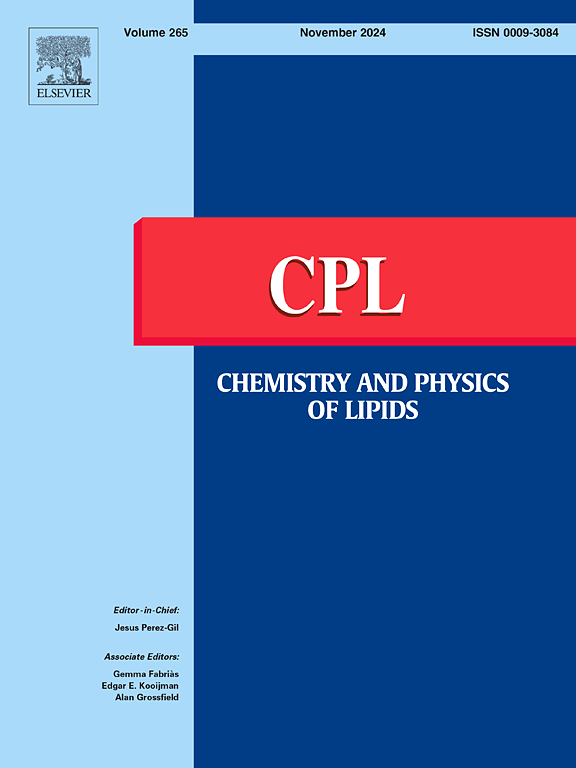Exploring the orphan immune receptor TREM2 and its non-protein ligands: In silico characterization
IF 2.8
3区 生物学
Q2 BIOCHEMISTRY & MOLECULAR BIOLOGY
引用次数: 0
Abstract
The triggering receptor expressed on myeloid cells 2 (TREM2) is an immunoreceptor that interacts with a wide range of non-protein ligands, and it has been implicated in infectious and non-infectious diseases. However, there is a limited understanding on how this receptor interacts with non-protein ligands and the potential of such information to develop new therapeutic drugs. Therefore, our study aimed to elucidate the interactions between TREM2 and its non-protein ligands. First, we searched PubChem and Protein Data Bank (PDB) for TREM2 structures and their corresponding non-protein ligands. Subsequently, these structures were employed in molecular docking and MM/GBSA simulations with the Maestro software and molecular dynamics in GROMACS software. TREM2 was subsequently subjected to druggable site prediction using CavityPlus and receptor-based drug repositioning via the DrugRep server. TREM2 interacts with high affinity with its 12 non-protein ligands, with affinity values ranging from −33.01 kcal/mol for phosphatidylserine to −80.87 kcal/mol for cardiolipin (CLP). In molecular dynamics simulations, homodimeric TREM2 bound more stably to its lipid ligands, such as CLP and PSF, whereas it was unstable when unbound. The interactions between the receptor and its non-protein ligands were driven by the complementarity determining regions (CDR) 1 and 2, that are present in the hydrophobic and positively charged regions, highlighting that the Y38–R98 region is fundamental for drugs targeting TREM2. Our data underscore the significance of TREM2's CDRs in recognizing its ligands, suggesting they as promising targets for prospective drug design studies.
探索孤儿免疫受体 TREM2 及其非蛋白配体:硅学表征。
髓系细胞上表达的触发受体 2(TREM2)是一种与多种非蛋白配体相互作用的免疫受体,它与感染性和非感染性疾病有关。然而,人们对该受体如何与非蛋白配体相互作用以及这些信息在开发新治疗药物方面的潜力了解有限。因此,我们的研究旨在阐明 TREM2 与其非蛋白配体之间的相互作用。首先,我们搜索了 PubChem 和蛋白质数据库(PDB)中 TREM2 的结构及其相应的非蛋白配体。随后,利用 Maestro 软件对这些结构进行分子对接和 MM/GBSA 模拟,并利用 GROMACS 软件进行分子动力学模拟。随后,利用 CavityPlus 对 TREM2 进行了可药用部位预测,并通过 DrugRep 服务器对基于受体的药物进行了重新定位。TREM2 与其 12 个非蛋白配体具有高亲和力,亲和力值从磷脂酰丝氨酸的 -33.01kcal/mol 到心磷脂(CLP)的 -80.87kcal/mol 不等。在分子动力学模拟中,同源二聚体 TREM2 与 CLP 和 PSF 等脂质配体的结合更为稳定,而未结合时则不稳定。受体与其非蛋白配体之间的相互作用是由互补性决定区(CDR)1和2驱动的,它们存在于疏水和带正电荷的区域,这突出表明 Y38-R98 区域对于靶向 TREM2 的药物至关重要。我们的数据强调了 TREM2 的 CDR 在识别其配体方面的重要性,表明它们是未来药物设计研究的有希望的靶点。
本文章由计算机程序翻译,如有差异,请以英文原文为准。
求助全文
约1分钟内获得全文
求助全文
来源期刊

Chemistry and Physics of Lipids
生物-生化与分子生物学
CiteScore
7.60
自引率
2.90%
发文量
50
审稿时长
40 days
期刊介绍:
Chemistry and Physics of Lipids publishes research papers and review articles on chemical and physical aspects of lipids with primary emphasis on the relationship of these properties to biological functions and to biomedical applications.
Accordingly, the journal covers: advances in synthetic and analytical lipid methodology; mass-spectrometry of lipids; chemical and physical characterisation of isolated structures; thermodynamics, phase behaviour, topology and dynamics of lipid assemblies; physicochemical studies into lipid-lipid and lipid-protein interactions in lipoproteins and in natural and model membranes; movement of lipids within, across and between membranes; intracellular lipid transfer; structure-function relationships and the nature of lipid-derived second messengers; chemical, physical and functional alterations of lipids induced by free radicals; enzymatic and non-enzymatic mechanisms of lipid peroxidation in cells, tissues, biofluids; oxidative lipidomics; and the role of lipids in the regulation of membrane-dependent biological processes.
 求助内容:
求助内容: 应助结果提醒方式:
应助结果提醒方式:


